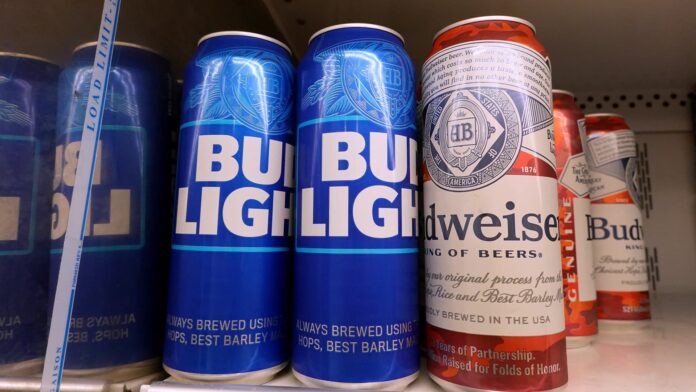Bud Light, made by Anheuser-Busch.
Joe Raedle | Getty Images
Hiking beer prices led Budweiser owner Anheuser-Busch InBev to profit and revenue growth last year, even U.S. sales of staple brand Bud Light were curbed by boycott action.
The world’s biggest brewer on Thursday recorded annual revenue of $59.38 billion, up 7.8%, but shy of analyst expectations of $60.48 billion, according to an LSEG-compiled consensus. Volumes sold fell by 1.7%, with beer brands declining by 2.3%.
Core profit (EBITDA) rose 7% annually to nearly $20 billion, also just under a forecast of $20.1 billion.
Belgium-listed shares dipped 0.2% in early Thursday trade.
Fourth-quarter sales came in slightly ahead of expectations at 6.2% growth. But revenue in the U.S. fell 17.3% in the quarter, as sales-to-retailers dropped 12.1% — a drop that the company primarily attributed to declines in sales of Bud Light, which lost its spot as the best-selling U.S. beer.
The company became embroiled in a social media-driven boycott of its core Bud Light brand in the middle of last year. It also weathered wider beer industry struggles from higher input costs and a squeeze on consumer spending.
On Thursday, the firm announced a full-year dividend of 0.82 euros ($0.89), up from 0.75 euros in 2022.
AB InBev CEO Michel Doukeris said the results were a “testament to the strength of the beer category, resilience of our business and people, consistent execution of our replicable growth drivers and our unwavering commitment to invest for long-term growth and value creation.”
Analysts at Bernstein on Thursday said the company saw a “solid end” to 2023, as price rises offset declining sales.
However, they flagged “cautious guidance and a tough pricing set-up in the USA,” and noted that sales trends in the final quarter were weaker than expected, driven by the continued hit to North America from Bud Light.
China was a bright spot, with profits up 32% due to the outperformance of premium products, they added.


